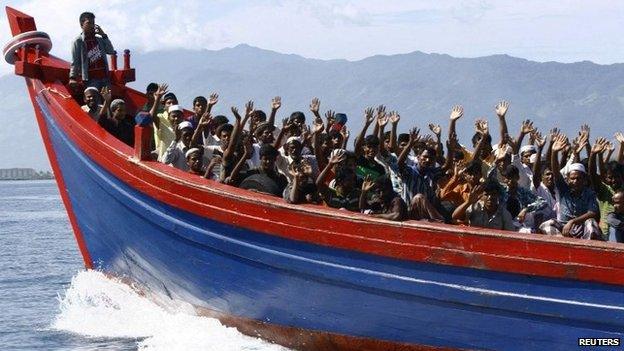Australia PM Tony Abbott defends asylum policy 'closed book'
- Published
Tony Abbott: "If we were at war we wouldn't be giving out information that is of use to the enemy"
Australian PM Tony Abbott has defended what critics have described as government secrecy over asylum policy.
Officials have in recent days refused to comment on reports that Australian naval forces have turned back at least one boat to Indonesia.
Asylum-seeker accounts have also alleged mistreatment by navy personnel.
Mr Abbott, who promised a tough line on the asylum issue when he took office, said restricting information flow boosted operational enforcement.
"I'd rather be criticised for being a bit of a closed book on this issue and actually stop the boats," he told local media.
"The point is not to provide sport for public discussion. The point is to stop the boats.
"I'm pleased to say it is now several weeks since we've had a boat, and the less we talk about operational details on the water, the better when it comes to stopping the boats."
'Force used'
The number of asylum boats travelling to Australia from Indonesia rose sharply in 2012 and the beginning of 2013.
Indonesia serves as a transit point for people-smugglers, who ferry people mainly from Iraq, Afghanistan, Iran and Sri Lanka to Christmas Island, the closest part of Australian territory, on rickety and over-crowded boats. Dozens of people have died making the journey in recent years.
In response, the Labor government reintroduced offshore processing on the Pacific island of Nauru and in Papua New Guinea's Manus Island. It also said that people found to be refugees would be settled in Papua New Guinea, not Australia.
When Mr Abbott's Liberal-National Coalition ousted Labor in the 7 September general election, it initiated Operation Sovereign Borders, giving the military control over the response to people-smugglers.

Australian media report that the government is to buy 16 lifeboats to ferry asylum seekers back to Indonesia
The Labor government had provided a detailed breakdown of asylum arrivals and vessel-related incidents.
But Mr Abbott's government has limited information to a weekly press briefing. In December the immigration minister appeared to suggest that this would be changed to a weekly e-mail.
Officials have refused to answer questions about reported incidents, citing operational needs.
These have included recent reports - both from Australia and Indonesia - that the Australian navy turned at least one boat carrying asylum seekers back to Indonesia.
The Australian Broadcasting Corporation (ABC) carried accounts from two men, external - from two separate asylum boats - who said their vessels had been intercepted.
Passengers were offloaded - some with physical force - and their boats towed for some distance. Passengers - who were only given one meal a day, according to one of the men - were then returned to their boats off Indonesia's coast, the men said.
Officials did respond to the men's claims, with Australia's Defence Force chief David Hurley saying personnel had acted in a "humane and considerate manner", the ABC said.
'Basic questions'
Australian media have also reported that the government is to buy 16 lifeboats to ferry asylum seekers back to Indonesia.
Indonesia's Foreign Minister Marty Natalegawa earlier this week declined to comment on specific incidents.
"But on the policy itself, let me once again put on record that Indonesia rejects Australia's policy to turn back the boats because such a policy is not actually conducive to a comprehensive solution," he said.
Ties between Australia and Indonesia remain strained in the wake of spying revelations in documents leaked by US whistle-blower Edward Snowden.
Australia's opposition leader urged the government to "start answering the most basic questions''.
''It's time for the Abbott government to stop hiding the boats,'' Bill Shorten added. ''If the policies are good, and if they're working, then why keep them a secret?''
The Greens, meanwhile, have hit out at the apparent decision by the Nauru government to raise the cost of a media fee from A$200 ($180, £108) to A$8,000.
Conditions at both the Nauru and Manus Island asylum processing camps have been the subject of stringent criticism from both UN agencies and human rights groups.
"It's designed to make it difficult for the media to access Nauru and to get information back to Australia," Greens Senator Sarah Hanson-Young was quoted by the ABC as saying.
- Published9 January 2014
- Published19 November 2013
- Published4 September 2013
- Published30 September 2013
- Published28 September 2013
- Published16 August 2013
- Published18 September 2013